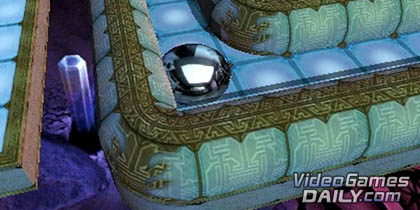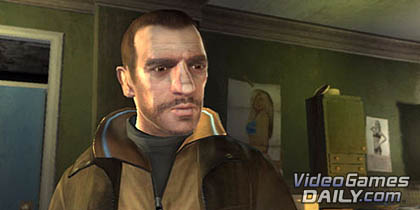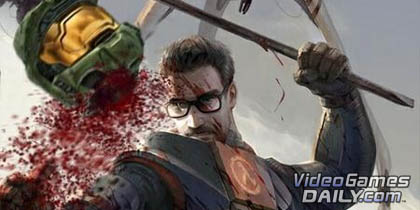
![]()
Dead or Alive
2000-2005

Next to the Virtua Fighter series, I view the gameplay mechanics of all other 3D fighters as Fisher Price – and I include the Dead or Alive series in that thorough technical assessment. Regardless, the Dead or Alive series’ gameplay is accessible and unpretentious, but that’s not why it’s on my list. Ever since its original debut (last decade) on Sega’s own Model 2 arcade board – and continuing into this decade with the phenomenal Dead or Alive 2 (this time on Sega’s Naomi board – and later on Dreamcast and PS2 in 2000), before entering into Xbox-exclusive territory with DOA3 and DOA4, EVERY single entry in the series has marked a profound, new level of audio-visual awesomeness that was unmatched by any other comparable game at the time of release. For me the pinnacle was Dead or Alive 4, whose rich character design, jaw-dropping multi-level background stages, and memorable soundtrack, exemplified what has made this a great series over the last decade.
Further Reading: Review, Interview
![]()
Mercury
2005-2007

Puzzle games are so numerous that it takes something really special to come along and instantly hook you, but Archer Maclean’s Mercury for the PSP was definitely one of those games. Extremely challenging once you’ve dug through the first few worlds, Mercury has the player carefully tilting a maze-like 3D level around, manoeuvring a blob of mercury and splitting it into multiple blobs, changing its colour, mixing colours with other blobs, and guiding each blob to the necessary goal – all against the clock. An immense problem solving, multi-tasking experience, the game was on occasion just too perplexing for its own good, but Mercury’s formula would have been wasted if the designers didn’t push the difficulty limits. I never got around to playing the sequel, Mercury Meltdown (PSP, Wii and PS2) or Mercury Meltwodn Revolution, but apparently the difficulty curve was one of the main improvements there.
Further Reading: Review
![]()
GTA IV
2008-2009

Some of the other decade round-ups I’ve seen over the last week or so have featured GTA III very prominently, but for me, GTA IV takes the final credit for the series over the last decade. I guess if we were to include III’s “sequels” Vice City and San Andreas as one, it would be a lot tougher to call (and there’s no reason why I couldn’t make this entry for the series, rather than GTA IV itself), but that’s how big a deal the fourth numbered entry in the series is on its own merits. Some of the GTA series’ trademarks span all of its instalments over the last decade – winning mission-based gameplay formula, killer soundtracks – and all are superbly amusing works of satire. But for me, GTA IV stands tall above its predecessors for three reasons: firstly on a personal level, I find the modern-era Liberty City and its multi-faceted inhabitants a lot more engrossing than “concept” 2001 Liberty City of GTA III, and more appealing than the clichéd gangster settings of 1980s Miami or 1990s California in Vice City and San Andreas respectively. Secondly, I put it to you that the characters and storytelling of GTA IV (and its episode follow-ups Lost and Damned and Gay Tony) are surely the best in the series to date. And thirdly, GTA IV is the most finely tuned in terms of gameplay and the most astounding in terms of technical achievement. San Andreas was hugely ambitious, mainly for its (still unmatched) grand scale, but GTA IV is a refined masterpiece in every sense.
Further Reading: GTA IV Coverage
![]()
The Orange Box
2004-2007

This is without question the single most essential purchase on Xbox 360 in my book, although the way these titles were bundled was probably a little confusing to many. The mind-blowing Portal is a title which should really appear on its own in any list of essential games, but it would be doing a service to Valve to promote The Orange Box as a whole, because if it’s still sitting in your to-play pile (or worse, if you haven’t even bought it yet) then you should be ASHAMED. That’s because, aside from Portal being one of the most innovative and surprising games of all time, Half-Life 2 is arguably STILL the best, most atmospheric, well written and most innovative FPS adventure ever made, despite the fact it’s now five years old. It’s also barely been improved upon by any other FPS in terms of technical and graphical achievement, while I’d be highly surprised to find a title that beats it in the audio department. Same applies to its two follow-up episodes (released in 2006 and 2007), which have kept the series front-of-mind — but made the wait for series finale Episode Three a rather long one (which will hopefully come to an end in 2010). Of course, Half-Life 2 offers nothing in the way of multiplayer – but that’s what The Orange Box’s superb Team Fortress 2 is for.
Further Reading: Review







 Satoru Iwata Video Interview - the late Nintendo president spoke with Kikizo in 2004 as 'Nintendo Revolution' loomed.
Satoru Iwata Video Interview - the late Nintendo president spoke with Kikizo in 2004 as 'Nintendo Revolution' loomed. Kaz Hirai Video Interview - the first of Kikizo's interviews with the man who went on to become global head of Sony.
Kaz Hirai Video Interview - the first of Kikizo's interviews with the man who went on to become global head of Sony. Ed Fries Video Interview - one of Xbox's founders discusses an epic journey from Excel to Xbox.
Ed Fries Video Interview - one of Xbox's founders discusses an epic journey from Excel to Xbox. Yu Suzuki, the Kikizo Interview - we spend time with one of gaming's most revered creators.
Yu Suzuki, the Kikizo Interview - we spend time with one of gaming's most revered creators. Tetris - The Making of an Icon: Alexey Pajitnov and Henk Rogers reveal the fascinating story behind Tetris
Tetris - The Making of an Icon: Alexey Pajitnov and Henk Rogers reveal the fascinating story behind Tetris Rare founders, Chris and Tim Stamper - their only interview? Genuinely 'rare' sit down with founders of the legendary studio.
Rare founders, Chris and Tim Stamper - their only interview? Genuinely 'rare' sit down with founders of the legendary studio. The History of First-Person Shooters - a retrospective, from Maze War to Modern Warfare
The History of First-Person Shooters - a retrospective, from Maze War to Modern Warfare
Hey, where’s Gran Turismo?!
No one had it on their list – NO ONE!
Allowedly, I noticed that not until I read Project Gotham Racing and Ridge Racer, but hey, isn’t it worth mention it? For me it’s the godfather of racing simulations. Tze tze, shame on you!